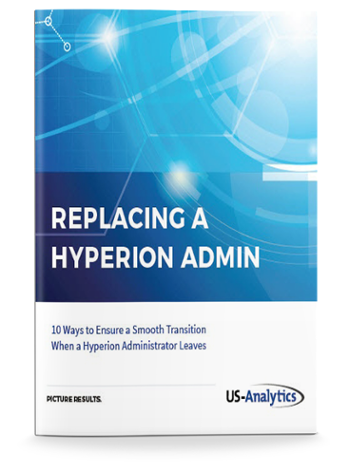Successfully supporting your Oracle Hyperion Planning application to maximize its effectiveness for your organization requires some planning on its own, as well as some proactive management to keep it running at peak performance.
Getting Started
First, it’s important to remember that planning is cyclical. You’re not going to be planning all year long — however, you are going to forecast on a monthly basis, and there are certain “knobs that need to be turned” and updates that need to occur. This is especially important because if these updates don’t occur on a timely basis and someone goes back to review their data, it may be overwritten.
Preparing for next year’s planning cycle requires a lot of work in your Planning application. For example, if the way certain data is reported has changed during the year, forms need to be updated to ensure that the data will be carried forward into next year. New accounts and geographic areas need to be added. New users need to be added and given access to certain modules and forms on an ongoing basis.
Here are some basic tips and best practices to help you support your Hyperion Planning platform:
Data
Make sure you optimize your data load files, sort records, and de-fragment Essbase databases regularly. Clean out any unnecessary data and consider creating a historical application. If your company produces large-scale, sparsely distributed data that is categorized into a number of large dimensions, consider utilizing Essbase’s Aggregate Storage Option (ASO).
Web Forms
Organize all your forms into folders and name them with a numbering scheme for simpler, more intuitive organization. Use Menus and Tasks lists to help guide users through the planning process.
Custom Menus
Consider using right-click menus to launch actions such as business rules, context-sensitive data forms, URLs, and context-sensitive process management to help users navigate more easily through the planning process.
Backup
The importance of this is obvious, so back up everything. Make sure you include:
- Essbase App Directory
- CSS file
- PlanningSystemDB.properties file
- All relational databases
- Integration plans
- Hyperion OpenLDAP
Key Takeaways
The challenge with fully supporting Hyperion in house is the difficulty of finding, training, and holding on to good Hyperion administrators, who typically have an average employment tenure of around two years. If you’re an enterprise-level CIO or IT manager, you may also be struggling with paying a full-time employee for a part-time job; the complexity of the Oracle Hyperion suite is such that experienced Hyperion experts and managers can command top salaries.
The solution is to outsource all or part of your admin function to a Hyperion managed services provider (MSP). Partnering with an MSP provides a number of benefits, including:
- Access to reliable, consistent Hyperion support without costly employee overhead
- Proactive software monitoring and maintenance to ensure that all apps are running smoothly and all patches and updates are installed for optimum performance
- As-needed infrastructure support to ensure that all hardware and networks are functioning properly
- Reduced risk from system failures, unplanned downtime, and lost data that can result from a poorly maintained Hyperion environment






